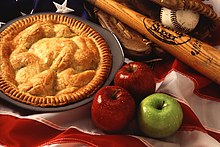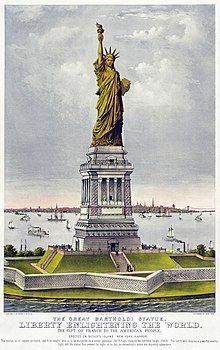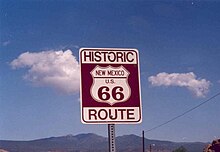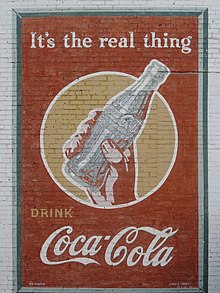Americana

Apple pie, baseball and the United States flag are three well-known American cultural icons.

Liberty Enlightening the World: the famous New York landmark illustrated in a print by Currier and Ives
Americana is a collective term for artifacts related to the history, geography, folklore and cultural heritage of the United States of America. It is generally defined as any collection of materials and things concerning or characteristic of the United States or of the American people; in its broadest sense, Americana is representative or even stereotypical of American culture as a whole.[1][2]
What is and is not considered Americana is heavily influenced by national identity, historical context, patriotism and nostalgia. The ethos or guiding beliefs or ideals which have come to characterize America, such as The American Dream, are central to the idea. American historian Hampton Sides wrote in Americana: Dispatches from the New Frontier:
.mw-parser-output .templatequote{overflow:hidden;margin:1em 0;padding:0 40px}.mw-parser-output .templatequote .templatequotecite{line-height:1.5em;text-align:left;padding-left:1.6em;margin-top:0}
The United States of America is such as glorious mess of contradiction, such a crazy quilt of competing themes, such a fecund mishmash of people and ideas, that defining us is pretty much pointless. There is, of course, a kind of faded notion of "Americana", one that concerns Route 66, diners, freak rock formations, and the like—but even in it's halcyon days this "roadside attraction" version of America was never an accurate or nuanced distillation of our massively complicated culture.
There are scenes and places, wattages and personages, that belong—inextricably, unmistakably—to this country alone. There is an American quality, a tone, an energy ... instantly recognizable ..."[3][page needed]
Many kinds of cultural artifacts fall within the definition of Americana: the things involved need not be old, but are usually associated with some quintessential element of the American experience. Each period of United States history is reflected by the advertising and marketing of the time, and the various types of antiques, collectibles, memorabilia and vintage items from these time periods are typical of what is popularly considered Americana. The Atlantic described the term as "slang for the comforting, middle-class ephemera at your average antique store—things like needle-pointed pillows, Civil War daguerreotypes, and engraved silverware sets".[4] Americana encompasses not only material objects but also people, places, concepts and historical eras which are popularly identified with American culture.
The name "Americana" also refers to Americana music, a genre of contemporary music which incorporates elements of various American music styles, including country, roots-rock, folk, bluegrass and blues, resulting in a distinctive roots-oriented sound.[5][6]
Contents
1 Americana as nostalgia
2 Examples
2.1 Brand names
2.2 Eras and periods
2.3 Music
2.4 Religion
2.5 Film
2.6 Television
2.7 Cultural icons
3 See also
3.1 Similar concepts in other nations
4 Notes
5 References
6 External links
Americana as nostalgia
From the mid to late 20th century, Americana was largely conceptualized as a nostalgia for an idealized life in small towns and cities in the United States around the turn of the century, roughly in the period between 1880 and the First World War, popularly considered "The Good Old Days".[7] It was believed that much of the structure of 20th-century American life and culture had been cemented in that time and place. American author Henry Seidel Canby wrote:
"It is the small town, the small city, that is our heritage. We have made twentieth-century America from it, and some account of these communities as they were ... we owe our children and grandchildren."[8]
The nostalgia for this period was based on a remembrance of confidence in American life that had emerged during the period due to such factors as a sense that the frontier had finally been "conquered", with the U.S. Census Bureau's declaration that it was "closed" in 1890, as well as the recent victory in the Spanish–American War.[7] By 1912, the contiguous United States was at last fully politically incorporated, and the idea of the nation as a single, solid unity could begin to take hold.
As Canby put it,
Americans at this time "really believed all they heard on the Fourth of July or read in school readers. They set on one plane of time, and that the present, the Declaration of Independence, the manifest destiny of America, the new plumbing, the growth of the factory system, the morning paper, and the church sociable. It was all there at once, better than elsewhere, their own, and permanent. ... They had just the country they wanted...and they believed it would be the same, except for more bathtubs and faster trains, forever ... for the last time in living memory everyone knew exactly what it meant to be an American."[8]
On growing up Italian-American, novelist Don DeLillo stated:
"It’s no accident that my first novel was called Americana. This was a private declaration of independence, a statement of my intention to use the whole picture, the whole culture. America was and is the immigrant's dream, and as the son of two immigrants I was attracted by the sense of possibility that had drawn my grandparents and parents." (from Conversations With Don DeLillo)[9]
The zeitgeist of this idealized period is captured in the Disneyland theme park's Main Street, U.S.A. section (which was inspired by both Walt Disney's hometown of Marceline, Missouri and Harper Goff's childhood home of Fort Collins, Colorado),[10] as well as the musical and movie The Music Man and Thornton Wilder's stage play Our Town.[7] Especially revered in nostalgic Americana are small-town institutions like the barber shop,[11] drug store, soda fountain and ice cream parlor;[12] some of these were eventually resurrected by mid-twentieth century nostalgia for the time period in businesses like the Farrell's Ice Cream Parlour chain, with its 1890s theme.[13]
Examples

U.S. Route 66 sign

This Coca-Cola advertisement from 1943 is still displayed in Minden, Louisiana

By the middle of the 1940s, three-quarters of the records produced in America went into jukeboxes
Columbia, a personification of the United States
Uncle Sam, a popular personification of the U.S. federal government or of American military might
Star-Spangled Banner, the original garrison flag that inspired the U.S. national anthem
- American flag
- Old Glory
Liberty, a concept considered fundamental to the popular American identity
Baseball, often called America's national pastime- Apple pie
- Hot dog
- U.S. Route 66
- Jukebox
- Classical Hollywood cinema
- Drive-in theater
- Diner
- Ice cream parlor
- Hot rod
- White picket fence[14]
Brand names
- Chevrolet
Harley-Davidson[a]
Coca-Cola[16][17]
- Jeep
- John Deere
- McDonald's
- Texaco
- The Walt Disney Company
- Marlboro
Levi's blue jeans, especially Levi's 501s[17][18]
Zippo lighters[19]
- Pan Am
- Ray-Ban
- Delta Air Lines
- Jack Daniel's
- Jim Beam
- Budweiser
- Gulf Oil
Eras and periods
- Wild West
- Industrial Revolution
- Gilded Age
- Roaring Twenties
- Great Depression
- Golden Age of Capitalism
- Beat Generation
Music
- Rock and roll
- Jazz
- Country and western
- Blues
- Disco
- Hip hop
- "Yankee Doodle" (song)
- CBGB
- Studio 54
Religion
Camp meeting[20]
Tent revival[20]
- The Church of Jesus Christ of Latter-day Saints
Film
The Wizard of Oz (1939)
Gone with the Wind (1939)
It's a Wonderful Life (1946)
Giant (1956)
The Music Man (1962)
Easy Rider (1969)
Nashville (1975)
Television
- Little House on the Prairie
- Happy Days
- M*A*S*H
- The Twilight Zone
- All in the Family
- Dallas
- Saturday Night Live
- The Tonight Show
- The Simpsons
Cultural icons

George Washington on the 1928 dollar bill
- George Washington
- Abraham Lincoln
- Mark Twain
- Henry Ford
- Mickey Mouse
- Elvis Presley
- Michael Jackson
- Marilyn Monroe
- Andy Warhol
- John F. Kennedy
- Hunter S. Thompson
- Babe Ruth
- Muhammad Ali
- Ronald Reagan
- Norman Rockwell
- Michael Jordan
See also
- History of immigration to the United States
- Culture of the United States
- History of the United States
- American studies
- Transcendentalism
- Romanticism
- Black Americana
Similar concepts in other nations
- Australiana
- Canadiana
- Hawaiiana
- Kiwiana
- Rhodesiana
Notes
^ "At the soul of every Harley-Davidson is something hard to explain. But easy to understand once you're on one. It's a strong attraction that has to do with pride, style and a powerful piece of Americana." (from a 1987 Harley-Davidson advertisement)[15]
References
^ "Americana"..mw-parser-output cite.citation{font-style:inherit}.mw-parser-output .citation q{quotes:"""""""'""'"}.mw-parser-output .citation .cs1-lock-free a{background:url("//upload.wikimedia.org/wikipedia/commons/thumb/6/65/Lock-green.svg/9px-Lock-green.svg.png")no-repeat;background-position:right .1em center}.mw-parser-output .citation .cs1-lock-limited a,.mw-parser-output .citation .cs1-lock-registration a{background:url("//upload.wikimedia.org/wikipedia/commons/thumb/d/d6/Lock-gray-alt-2.svg/9px-Lock-gray-alt-2.svg.png")no-repeat;background-position:right .1em center}.mw-parser-output .citation .cs1-lock-subscription a{background:url("//upload.wikimedia.org/wikipedia/commons/thumb/a/aa/Lock-red-alt-2.svg/9px-Lock-red-alt-2.svg.png")no-repeat;background-position:right .1em center}.mw-parser-output .cs1-subscription,.mw-parser-output .cs1-registration{color:#555}.mw-parser-output .cs1-subscription span,.mw-parser-output .cs1-registration span{border-bottom:1px dotted;cursor:help}.mw-parser-output .cs1-ws-icon a{background:url("//upload.wikimedia.org/wikipedia/commons/thumb/4/4c/Wikisource-logo.svg/12px-Wikisource-logo.svg.png")no-repeat;background-position:right .1em center}.mw-parser-output code.cs1-code{color:inherit;background:inherit;border:inherit;padding:inherit}.mw-parser-output .cs1-hidden-error{display:none;font-size:100%}.mw-parser-output .cs1-visible-error{font-size:100%}.mw-parser-output .cs1-maint{display:none;color:#33aa33;margin-left:0.3em}.mw-parser-output .cs1-subscription,.mw-parser-output .cs1-registration,.mw-parser-output .cs1-format{font-size:95%}.mw-parser-output .cs1-kern-left,.mw-parser-output .cs1-kern-wl-left{padding-left:0.2em}.mw-parser-output .cs1-kern-right,.mw-parser-output .cs1-kern-wl-right{padding-right:0.2em}
^ "Americana". Dictionary.com.
^ Sides, Hampton (2007). Americana: Dispatches from the New Frontier. Knopf Doubleday Publishing Group. ISBN 1400033551.
^ Giovanni Russonello. "Why Is a Music Genre Called 'Americana' So Overwhelmingly White and Male?". The Atlantic.
^ Shriver, Jerry (31 August 2009). "Grammys will be putting Americana on the map". USA Today.
^ "2011 Grammy Category Descriptions" (PDF). Retrieved 18 December 2012.
^ abc Sears, Stephen (1975). Hometown U.S.A. New York: American Heritage. pp. 6–9. ISBN 0-671-22079-9.
^ ab Canby, Henry Seidel (1934). The Age of Confidence: Life in the Nineties. New York: Farrar & Rinehart. ASIN B000857UVO.
^ DeLillo, Don (January 13, 2005). Conversations with Don DeLillo. University Press of Mississippi. p. 88. ISBN 1578067049.
^ "Local History Archive Larimer Legends - Old Town & Disneyland - City of Fort Collins, Colorado". Library.ci.fort-collins.co.us. Archived from the original on 2009-01-25. Retrieved 2013-12-19.
^ Sears, Stephen (1975). Hometown U.S.A. New York: American Heritage. pp. 12–13, 29. ISBN 0-671-22079-9.
^ Sears, Stephen (1975). Hometown U.S.A. New York: American Heritage. pp. 12–13, 20. ISBN 0-671-22079-9.
^ "Farrell's looks to restart growth Owner outlines expansion plans for iconic ice cream chain". Nation's Restaurant News. August 31, 2010. Retrieved 4 June 2014.
^ Xiong, Nzong (2008-03-03). "White picket fences appease homeowners". TuscaloosaNews.com. McClatchy-Tribune News Service. Archived from the original on 2015-09-02.Americana aside, people like white picket fences for a couple of practical reasons.
^ Field and Stream. March 1987.
^ Melvin, Don. "Coca-cola A Sip Of Americana Things Have Been Going Better With Coke Since 1886." Florida Sun-Sentinel. 7 October 1990
^ ab Day, Sherri and Stuart Elliot. "Coca-Cola Goes Back to Its 'Real' Past." New York Times. 10 January 2003
^ Babcock, Gregory. "10 American Menswear Essentials That Will Literally Never Go Out of Style." Complex. 9 April 2015
^ "The Short Story About The American Icon - The Legendary Zippo Lighter". BuzzFeed. Retrieved 2018-05-07.
^ ab Stoutland, Frederick A. (2006). Landscapes of Christianity. FAS Publishing. p. 361. ISBN 9780977234103.
External links
| Look up Americana or americana in Wiktionary, the free dictionary. |
| Wikimedia Commons has media related to Americana. |
- Merriam-Webster definition of "Americana"